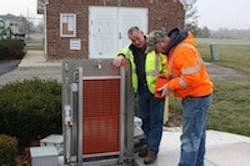Grinding Down Wet-Well Cleaning & Pump Repair Costs
When Otter Creek Water Reclamation District was faced with expensive recurring cleanup costs at its largest wastewater pump station, engineers solved the problem with the Muffin Monster.
The village of South Elgin, established in 1897, is a community that attracts visitors and new residents with its old world charm. Located about 40 miles northwest of Chicago, the village’s 22,000 residents rely on three wastewater pump stations. The largest of these is located at the Thornwood Lift Station where flow to the station is about 490 gal per minute (gpm) (110 cu meters per hour) and three 40-hp (30-kW) pumps need to move sewage at about 600 gpm (136 cu meters per hour) at 36 ft (11 meters) TDH. Here, buildup of rags, trash wrappings and other debris were clogging the system and forcing it offline. This necessitated regular cleanings totaling more than $19,000 per year.
The water and wastewater systems within the southwestern portion of South Elgin, including the Thornwood Lift Station, are owned and operated by the Otter Creek Water Reclamation District. RHMG Engineers serves as the district engineer for Otter Creek. Otter Creek contracts with the village of South Elgin for the operation and maintenance of its system. According to Dave Jaeschke, RHMG’s senior environmental engineer, they were running into a new and growing problem.
“Pumping stations and sewage treatment plants are filling with more and more polyester-reinforced rags—baby wipes, mop heads and cleaning wipes used in restaurants and homes,” he explained. “Because of the polyester fibers in them, they don’t break up or decompose in wastewater. Eventually this debris builds up and clogs pump impellers to the point it shuts down. As a result, we were forced to hire a Vactor truck four times a year to the tune of $4,900 a pop to clean out the rags from the wet well.”
In addition to the rags building up in the wet-well, they accumulated over the cables leading to the submersible pumps. Over time, the weight would disconnect the cables, inadvertently shutting off and short-circuiting the pumps. Pumps had to be either reset or completely rebuilt. Both scenarios required expensive equipment to pull up the pumps.
When the pump maintenance costs are added to the $19,000 per year wet-well cleaning costs, the numbers quickly skyrocket.
To combat these soaring expenses, RHMG proposed installing a JWC Environmental Muffin Monster to grind up the debris. The Monster would not only eliminate the quarterly cleaning and protect the three pumps, it would also improve energy efficiency; i.e., without impairment from rags, the pumps wouldn’t need to go on and off as often, reducing wear and tear.
The Muffin Monster model 30005-0024, which handles flow rates up to 1,000 gpm (230 cu meters per hour), was selected for the Otter Creek wastewater pump station. The Muffin Monster is a low-speed, high torque grinder with sharp steel cutter teeth that quickly shred rags, rock, wood, clothing, plastics and other debris into confetti-size particles that won’t clog pump impellers. This allows the wastewater to flow smoothly though pumps and pipeline to the wastewater treatment area.
To install the Monster in the inlet system, JWCE’s custom stainless steel guide rails were attached to the sides of the wet-well. Then, the grinder was slid down into place about 20 ft (6 meters) below so that it fit perfectly in front of the influent pipe.
Since the grinder’s installation a year ago, there has been no need to bring in a Vactor truck for cleaning, nor have there been any pump maintenance issues.
“The Monster still looks brand new and there are no signs of wear,” said Dan Mann, water and sewer superintendent for the village of South Elgin. “The savings are really unbelievable. In addition to the savings on expensive wet-well cleaning costs, a huge savings was realized by no longer having to pull up pumps and perform maintenance.”
Cynthia Guardia is president of CIA Communications. For more information, contact JWC Environmental at [email protected] or 800.331.2277.
